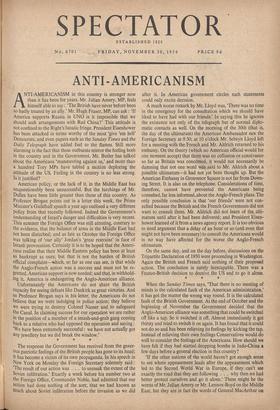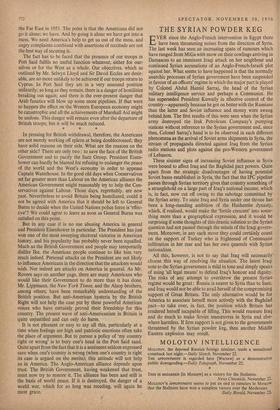ANTI-AMERICANISM
NTI-AMERICANISM in this country is stronger now than it has been for years. Mr. Julian Amery, MP, feels himself able to say : 'The British have never before been so badly treated by an ally.' Mr. Hugh Fraser, MP, can ask : 'If America supports Russia in UNO is it impossible that we should seek arrangements with Red China?' This attitude is not confined to the Right's lunatic fringe. President Eisenhower has been attacked in terms worthy of the most 'give 'em hell' Democrats, and even papers such as the Sunday Times and the Daily Telegraph have added fuel to the flames. Still more alarming is the fact that these outbursts mirror the feeling both in the country and in the Government. Mr. Butler has talked about the Americans `manoeuvring against us,' and more than a hundred Tory MPs have tabled a motion deploring the attitude of the US. Feeling in the country is no less strong. Is it justified?
American policy, or the lack of it, in the Middle East has unquestionably been unsuccessful. But the lurchings of Mr. Dulles have been little greater than those of this country. As Professor Brogan points out in a letter this week, the Prime Minister's Guildhall speech a year ago outlined a very different policy from that recently followed. Indeed the Government's understanding of Israel's danger and difficulties is very recent. This summer the Foreign Office was still attesting. contrary to the evidence, that the balance of arms in the Middle East had not been disturbed; and as late as October the Foreign Office was talking of 'our ally' Jordan's 'great restraint' in face of Israeli provocation. Certainly it is to be hoped that the Ameri- cans realise that their Middle Eastern policy has been at least as bankrupt as ours; but that is not the burden of British Official complaint—which, so far as one can see, is that while the Anglo-French action was a success and must not be re- gretted, American support is now needed; and that, in withhold- ing it, America is endangering the Anglo-American alliance.
Unfortunately the Americans do not share the British capacity for seeing defeats like Dunkirk as great victories. And as Professor Brogan says in his letter, the Americans do not believe that we were indulging in police action; they believe We were trying to destroy Colonel Nasser and to safeguard the Canal. In claiming success for our operation we are rather in the position of a member of a smash-and-grab gang coming back to a relative who had opposed the operation and saying : `We have been extremely successful : we have not actually got any jewellery but we did break the window.'
* * * The response the Government has received from the gener- ous patriotic feelings of the British people has gone to its head; it has become a victim of its own propaganda. In his speech in New York on Monday the Foreign Secretary solemnly said : `The result of our action was . . . to unmask the extent of the Soviet infiltration.' Exactly a week before his number two at the Foreign Office, Commander Noble, had admitted that our action had done nothing of the sort; that we had known as much about Soviet infiltration before the invasion as we did after it. In American government circles such statements could only excite derision.
A much worse remark by Mr. Lloyd was, 'There was no time in the emergency for the consultation which we should have liked to have had with our friends.' In saying this he ignores the existence not only of the telegraph but of normal diplo- matic contacts as well. On the morning of the 30th (that is, the day of the ultimatum) the American Ambassador saw the Foreign Secretary at 9.30; at 10 o'clock Mr. Selwyn Lloyd left for a meeting with the French and Mr. Aldrich returned to his embassy. On the theory (which no American official would for one moment accept) that there was no collusion or connivance so far as Britain was concerned, it would not necessarily be damning that not one word was said to Mr. Aldrich about a possible ultimatum—it had not yet been thought up. But the American Embassy in Grosvenor Square is not far from Down- ing Street. It is also on the telephone. Considerations of time, therefore, cannot have prevented the Americans being consulted, far less informed, about the Anglo-French plans. The only possible conclusion is that 'our friends' were not con- sulted because the British and the French Governments did not want to consult them. Mr. Aldrich did not learn of the ulti- matum until after it had been delivered; and President Eisen- hower learned of it from a news agency report. It is too obvious to need argument that a delay of an hour or so (and even that might not have been necessary) to consult the Americans would in no way have affected for the worse the Anglo-French ultimatum.
On the same day, and on the day before, discussions on the Tripartite Declaration of 1950 were proceeding in Washington. Again the British and French said nothing of their proposed action. The conclusion is surely inescapable. There was a Franco-British decision to deceive the US and to go it alone.
When the Sunday Times says, 'That there is no meeting of minds is the calculated fault of the American administration,' it has got the matter the wrong way round. It is the calculated fault of the British Government. At the end of October and the beginning of November the Government decided that the Anglo-American alliance was something that could be switched off like a tap. So it switched it off. Almost immediately it got thirsty and tried to switch it on again. It has found that it could not do so and has been relieving its feelings by kicking the tap. Instead of relieving their own feelings Conservatives would do well to consider the feelings of the Americans. How should we have felt if they had started dropping bombs in Indo-China a few days before a general election in this country?
`If the other nations of the world haven't got enough sense to see where appeasement leads after the appeasement which led to the Second World War in Europe, if they. can't see exactly the road that they are following . . . why then we had better protect ourselves and go it alone.' These might be the words of Mr. Julian Amery or Mr. Lennox-Boyd on the Middle East; but they are in fact the words of General MacArthur on the Far East in 1951. The point is that the Americans did not go it alone; we have. And by going it alone we have got into a mess. We need America's help to get us out of the mess, and angry complaints combined with assertions of rectitude are not the best way of securing it.
The fact has to be faced that the presence of our troops in Port Said fulfils no useful function whatever, either for our- selves or for the West as a whole. Our objectives, which as outlined by Mr. Selwyn Lloyd and Sir David Eccles are desir- able, are no more unlikely to be achieved if our troops return to Cyprus. In Port Said they are in a very unsound position militarily; so long as they remain, there is a danger of hostilities breaking out again; and there is the ever-present danger that Arab fanatics will blow up some more pipelines. If that were to happen the effect on the Western European economy might be catastrophic and all the achievements of Marshall Aid might be undone. This danger will remain even after the departure of British troops; but it will be much reduced.
In pressing for British withdrawal, therefore, the Americans are not merely working off spleen at being doublecrossed; they have solid reasons on their side. What are the reasons on the other side? There are only two : to save the face of the British Government and to pacify the Suez Group. President Eisen- hower can hardly be blamed for refusing to endanger the peace of the world and the West's economy in order to appease Captain Waterhouse. In the good old days when Conservatives set far greater store than Labour on the American alliance the American Government might reasonably try to help the Con- servatives against Labour. Those days, regrettably, are now past. Nevertheless to avoid Britain being humiliated, could it not be agreed with America that it should be left to General Burns to decide when the United Nations police force is `effec- tive"? We could agree to leave as soon as General Burns was satisfied on this point.
But in any case it is no use abusing America in general and President Eisenhower in particular. The President has just won one of the most sweeping electoral victories in American history, and his popularity has probably never been equalled. Much as the British Government and people may temporarily dislike Ike, the American people continue to like him very much indeed. Personal attacks on the President are not likely to influence Americans in the direction that the attackers would wish. Nor indeed are attacks on America in general. As Mr. Rovere says on another page, there are many Americans who would like their Government to do more than it has done. Mr. Lippmann, the New York Times, and the Alsop brothers, among others, have been remarkably understanding of the British position. But anti-American hysteria by the British Right will not help the case put by these powerful American voices who have certainly proved their friendship for this country. The present wave of anti-Americanism in Britain is quite unjustified and can only do harm.
It is not pleasant or easy to say all this, particularly at a time when feelings are high and patriotic emotions often take the place of argument. But to pursue a policy of `my country right or wrong' is to bury one's head in the Port Said sand. Quite apart from the fact that it is a sentiment seldom expressed save when one's country is wrong (when one's country is right its case is argued on the merits), this attitude will not help us in America. The Anglo-American alliance depends upon trust. The British Government, having weakened that trust, must now try to restore it. The alliance has been and still is the basis of world peace. If it is destroyed, the danger of a world war, which for so long was receding, will again be most grave.



















































 Previous page
Previous page